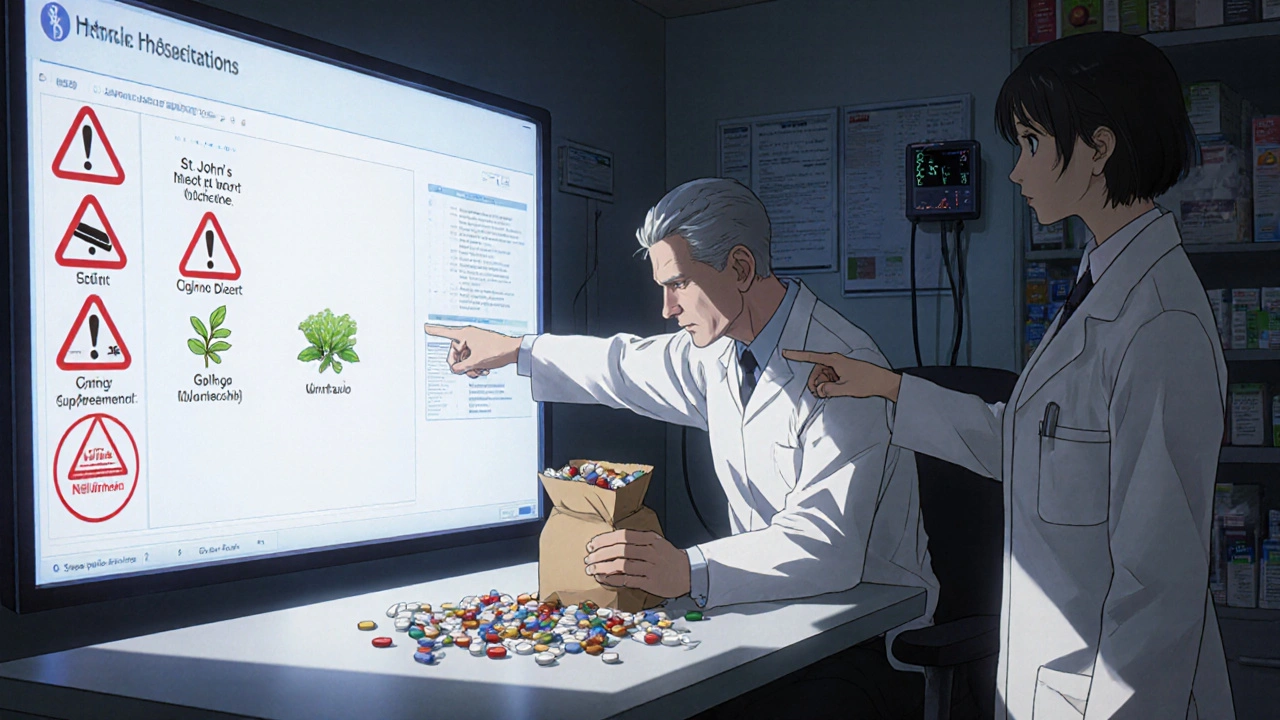
Every year, over 23,000 people in the U.S. end up in the emergency room because a supplement they took messed with their prescription meds. And it’s not just rare cases - it’s happening to people who thought, "It’s natural, so it must be safe." If you’re taking anything from a bottle labeled "vitamin," "herbal," or "dietary supplement," and you’re also on prescription medication, you need to know this: natural doesn’t mean harmless.
Why Your Supplement Might Be Dangerous With Your Meds
Your body doesn’t care if something comes from a plant, a lab, or a vitamin aisle. It processes everything the same way - through enzymes, absorption channels, and metabolic pathways. That’s where the trouble starts. For example, St. John’s wort, a popular herb for mood support, can cut the effectiveness of birth control pills by up to 50%. It also interferes with heart meds, antidepressants, and even drugs used after organ transplants. A 2021 study showed it reduces cyclosporine levels - the drug that keeps transplanted organs from being rejected - by nearly half. That’s not a minor issue. That’s life-threatening. Even something as simple as calcium or iron supplements can block your body from absorbing antibiotics like tetracycline or thyroid meds like levothyroxine. They fight for the same space in your gut. If you take them together, neither works right. Then there’s ginkgo biloba. People take it for memory, but it thins the blood. When combined with warfarin, Eliquis, or aspirin, it can cause internal bleeding. One Reddit user reported a seven-day hospital stay after mixing ginkgo with Eliquis. He didn’t tell his doctor he was taking it. Vitamin E at doses over 400 IU can raise your INR (a blood clotting measure) by 15-20% if you’re on warfarin. That means your blood takes longer to clot - and even a small bump could lead to serious bleeding.Which Supplements Are High Risk?
Not all supplements are created equal when it comes to interactions. Experts have grouped them by risk level:- High-risk (avoid with most meds): St. John’s wort, goldenseal, kava, echinacea (can affect liver enzymes), and garlic (blood thinner).
- Moderate-risk (use with caution): Ginkgo biloba, fish oil, vitamin E (400 IU+), ginger, and green tea extract.
- Low-risk (generally safe with most meds): Milk thistle, cranberry, American ginseng, black cohosh, and valerian.
How to Check for Interactions - The Real Way
Google searches won’t cut it. Neither will reading the back of the bottle. Most supplement labels don’t list interactions - and if they do, they’re often vague or missing entirely. Here’s what actually works:- Make a full list - every prescription, over-the-counter pill, vitamin, herb, and even CBD or melatonin. Include doses and how often you take them.
- Bring it to your doctor or pharmacist - not just once, but every time you start something new. The "brown bag method" - dumping everything out on the counter - reduces medication errors by 37%, according to Johns Hopkins.
- Ask your pharmacist - they’re trained for this. Walgreens and CVS now screen for supplement interactions during every prescription fill. In 2021, they caught dangerous combos in 18% of cases.
- Check the label - look for "Warning" statements. If it says "Do not take with blood thinners" or "May interfere with antidepressants," pay attention.
Special Cases: Surgery, Pregnancy, and Chronic Illness
If you’re scheduled for surgery, stop high-risk supplements at least 7-10 days before. Garlic, ginkgo, fish oil, and vitamin E all increase bleeding risk. Your surgeon needs to know what you’re taking - even if you think it’s "just a supplement." Pregnant women should avoid nearly all herbal supplements unless cleared by an OB-GYN. Many herbs can trigger contractions or affect fetal development. Even chamomile and peppermint tea in large amounts aren’t risk-free. People with chronic conditions - diabetes, heart disease, kidney problems, or autoimmune disorders - are especially vulnerable. Supplements can throw off blood sugar, blood pressure, or immune responses. A 2023 study found that 78% of adults over 50 take both meds and supplements, but only 32% tell their doctor about the supplements.What to Do If You’ve Already Mixed Them
If you’ve been taking a supplement with your medication and you feel off - dizzy, nauseous, unusually tired, bruising easily, or having heart palpitations - stop the supplement and call your doctor. Don’t wait. Symptoms of a bad interaction can be subtle. You might think it’s just "getting older" or "stress." But it could be your liver struggling to process two things at once, or your blood thinning too much, or your antidepressant losing its punch. If you’re on warfarin and your INR suddenly spikes, or your blood pressure drops without reason, or your antidepressant stops working - stop the supplement and get tested.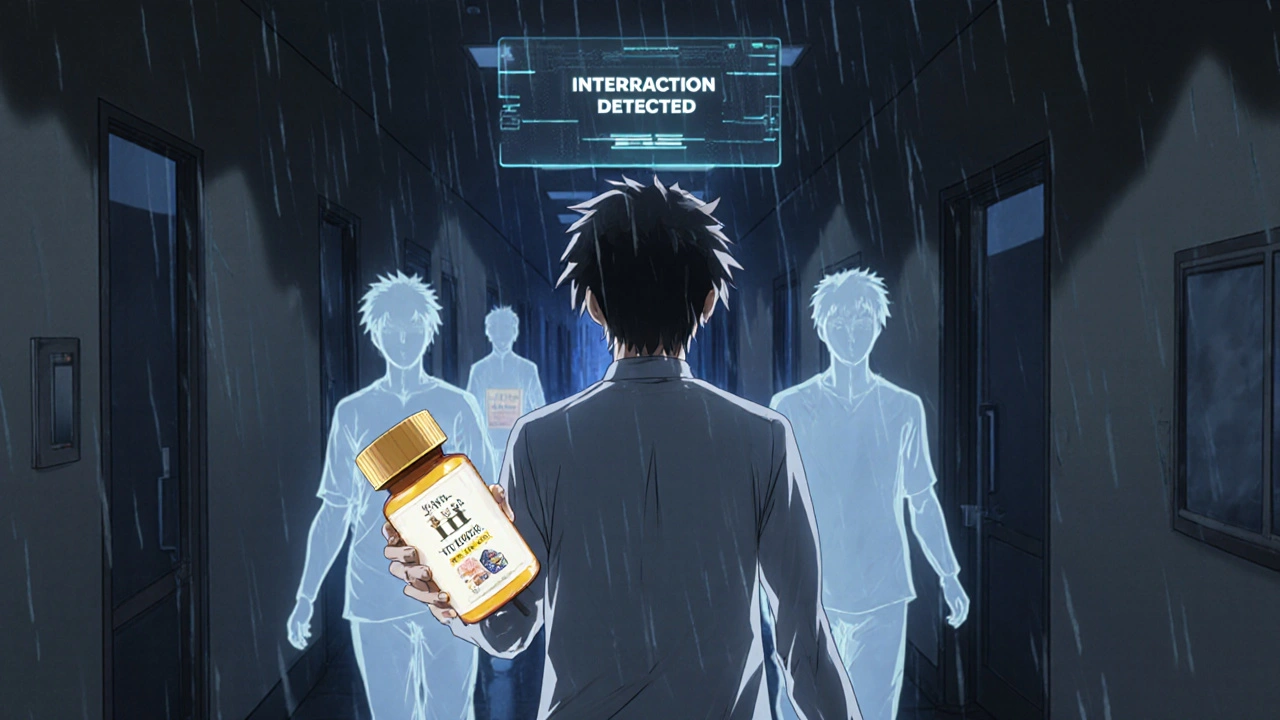
What’s Changing in 2025
The FDA is cracking down. In 2023, they issued 142 warning letters to supplement makers making illegal drug claims. They’re also pushing for better labeling - including mandatory interaction warnings. Epic Systems, the company behind most U.S. electronic health records, started adding supplement interaction alerts in 15% of hospitals in early 2024. That means your doctor might soon see a pop-up warning if you’re on warfarin and taking ginkgo. The National Institutes of Health is funding a $4.2 million project to build an AI tool that predicts supplement-drug risks. It’s not here yet, but it’s coming.Bottom Line: Be Proactive, Not Lucky
You wouldn’t mix gasoline and bleach. Don’t mix your meds and supplements without checking. The supplement industry is worth over $56 billion in the U.S. - and it’s barely regulated. The burden is on you. Keep a written list. Talk to your pharmacist. Don’t assume "natural" means safe. And if you’re unsure - skip it until you get a clear answer. Your health isn’t a gamble. Don’t let a bottle from the grocery store put you in the hospital.Can I take vitamin D with my blood pressure medication?
Yes, vitamin D is generally safe with most blood pressure medications. There’s no strong evidence it interferes with ACE inhibitors, beta-blockers, or calcium channel blockers. But if you’re taking a diuretic like hydrochlorothiazide, high doses of vitamin D could raise calcium levels too much. Stick to the recommended dose (600-800 IU daily) and check your blood calcium levels if you’re on long-term high-dose vitamin D.
Is it safe to take fish oil with aspirin?
It’s risky. Both fish oil and aspirin thin the blood. Together, they can increase your chance of bleeding - especially if you’re also on warfarin or Eliquis. If you’re taking low-dose aspirin for heart protection and want to add fish oil, talk to your doctor first. They might adjust your aspirin dose or recommend a lower omega-3 dose (under 1,000 mg daily).
Can St. John’s wort affect my birth control?
Yes - and it’s one of the most dangerous interactions. St. John’s wort speeds up how your liver breaks down hormones in birth control pills, patches, and IUDs. Studies show it can reduce hormone levels enough to cause unplanned pregnancy. Even if you’ve taken it before without issue, your body’s metabolism can change. Never combine them without talking to your doctor.
Do I need to tell my doctor about supplements if I’m healthy?
Yes. Even if you feel fine, supplements can quietly affect your labs - liver enzymes, kidney function, blood sugar, or cholesterol. Many people don’t realize they’re taking something that interacts with a medication they don’t even think about - like a calcium supplement interfering with thyroid meds. Your doctor needs the full picture to keep you safe.
What should I do if my supplement doesn’t list any warnings?
Don’t assume it’s safe. The FDA doesn’t require supplement labels to list drug interactions. Many brands don’t test for them. If there’s no warning, that doesn’t mean there’s no risk. Always check with a pharmacist or use a trusted interaction checker like the one from the National Institutes of Health (NCCIH) or MedlinePlus. When in doubt, hold off until you get professional advice.
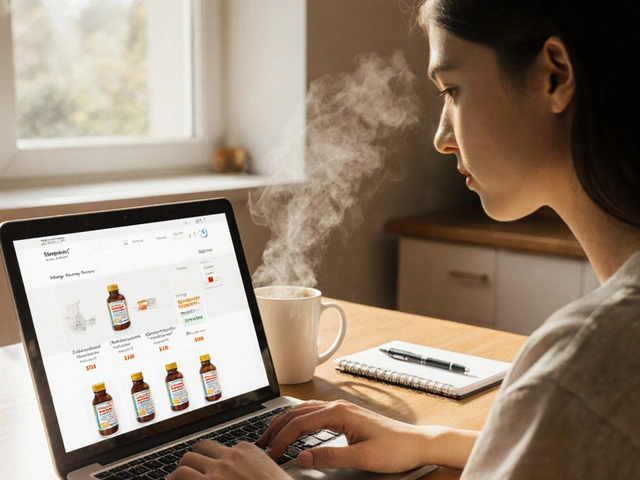
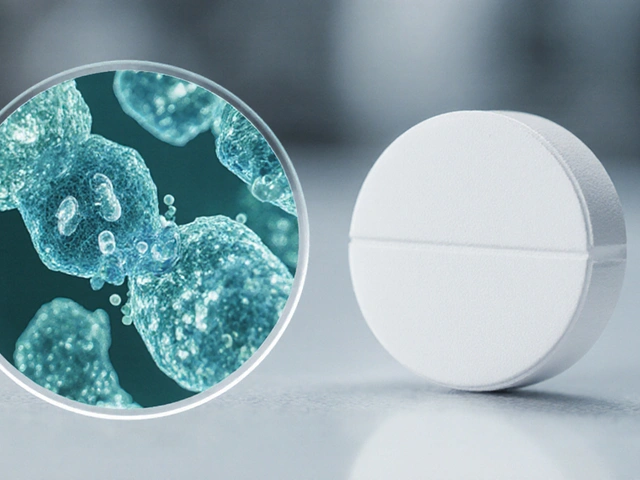

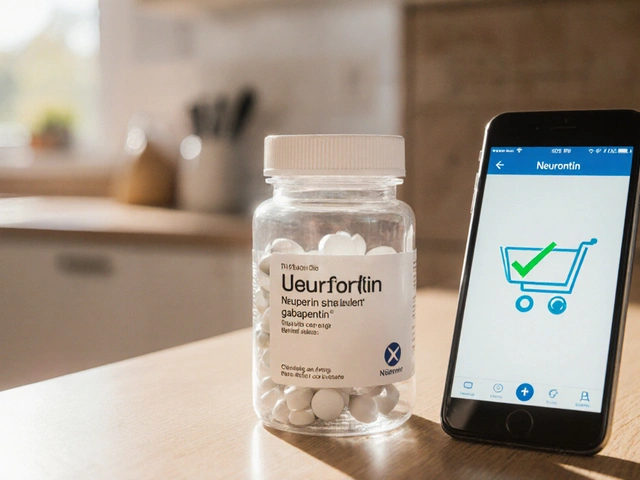

Hannah Blower
November 19, 2025 AT 00:44Oh wow, another ‘natural = safe’ martyr. Let me guess-you also think sunlight cures cancer and organic kale fixes your thyroid? The fact that people still think herbs are magic beans while ignoring pharmacokinetics is why we have ERs full of idiots. St. John’s wort isn’t ‘folk medicine,’ it’s a cytochrome P450 grenade. And no, your ‘wellness coach’ doesn’t know what she’s talking about. Go read a damn PubMed abstract before you swallow another capsule.
Gregory Gonzalez
November 19, 2025 AT 16:24So let me get this straight-we’re supposed to trust the FDA, who lets lead-laced glitter glue be sold as ‘cosmetic glitter,’ but we can’t trust a supplement label that says ‘may interact with blood thinners’? 😂 Classic American logic: ban the truth, sell the fear. Also, ‘pharmacist screening’? Yeah, the same guy who sold me ‘immune boost’ gummies with 300% DV of vitamin A last week. Thanks, capitalism.
Ronald Stenger
November 21, 2025 AT 00:3823,000 ER visits? That’s nothing. Last year, 12 million Americans took melatonin because they watched a TikTok. We’re a nation of hypochondriacs who think a $12 bottle of turmeric fixes insulin resistance. Meanwhile, real medicine-actual science-is being undermined by influencers selling ‘detox tea’ made from dirt and hope. This isn’t about supplements. It’s about the collapse of critical thinking. And no, ‘natural’ doesn’t mean ‘not poison.’ That’s why we have poison control.
Emily Entwistle
November 22, 2025 AT 01:56YESSSSS this is so important!! 🙌 I used to take ginkgo with my blood pressure med and woke up with a black eye from sneezing 😱 (true story). My pharmacist caught it when I brought my whole pill organizer in-she looked at me like I’d just admitted to feeding my cat Xanax. 🤦♀️ Now I only take vitamin D and magnesium, and I always ask ‘Will this kill me with my other pills?’ before I buy anything. 💊❤️ #PharmacistIsMyHero
Duncan Prowel
November 22, 2025 AT 02:15While the general sentiment is commendable, the article’s reliance on anecdotal Reddit case reports and non-peer-reviewed institutional statistics (e.g., ‘Johns Hopkins found…’) undermines its scientific credibility. A more rigorous approach would involve systematic reviews from Cochrane or meta-analyses from the Journal of Clinical Pharmacology. The omission of dose-response relationships and pharmacodynamic variability across ethnic populations further limits clinical applicability.
Bruce Bain
November 23, 2025 AT 22:25Look, I’m just a guy who takes fish oil and a multivitamin. I don’t know what cytochrome anything is. But I do know that if my grandma took 10 pills a day and lived to 92, maybe we ain’t all gonna die from a ginkgo pill. Still, I showed my list to the pharmacist. He said ‘don’t mix garlic with blood thinners.’ So I stopped. Simple. Don’t make it harder than it is.
Jonathan Gabriel
November 25, 2025 AT 08:36St. John’s wort interacts with 57 meds? Cool. So does coffee. So does grapefruit. So does not sleeping. Should we ban all of them? The real problem isn’t supplements-it’s that doctors don’t ask about them. I’ve had 3 different docs in 5 years and not one ever asked if I took anything besides my prescriptions. Not once. So now I just don’t tell them. Why? Because they don’t care. And if they don’t care, why should I? 🤷♂️ Also, typo: ‘cyclosporine’ is misspelled in paragraph 3. Just sayin’.
Don Angel
November 26, 2025 AT 16:50I really appreciate this post. It’s scary how many people assume supplements are harmless. I used to take melatonin and St. John’s wort together because I was stressed and sleep-deprived. Then I started having heart flutters. Turned out the combo was messing with my beta-blocker. I didn’t know. I felt so stupid. But now I keep a printed list. I take it to every appointment. I ask my pharmacist every time. It’s not hard. It’s just… attention. And attention saves lives.
benedict nwokedi
November 26, 2025 AT 22:04Let’s be real-this is all a Big Pharma psyop. They don’t want you to know that herbs work better than their patented drugs because herbs can’t be patented. The FDA? They’re owned by the same companies that make your pills. That’s why they don’t require interaction warnings-because if they did, you’d stop buying their $500/month drugs and switch to turmeric. And that’s not profit. That’s treason. The ‘AI tool’? It’s a distraction. The real solution? Stop trusting institutions. Start trusting nature. And stop letting them control your health.
deepak kumar
November 27, 2025 AT 23:26Great post! In India, people take ashwagandha with blood pressure meds all the time without knowing risks. My uncle had a stroke last year because he took it with lisinopril-no one warned him. I now teach my family: ‘Ask the pharmacist, not the chaiwala.’ Also, vitamin D + calcium + thyroxine? Big mistake. Took me 3 months to figure out why my TSH was wild. Always space them out. 4 hours apart. Simple. Life-saving.
Dave Pritchard
November 29, 2025 AT 11:40For anyone new to this stuff: don’t panic. You don’t need to be a scientist. Just make a list. Write it down. Bring it to your pharmacist. Say ‘I’m not sure if this is safe with my other pills.’ That’s it. They’re trained for this. They want to help. And if they don’t know? Ask them to look it up. You’re not bothering them-you’re giving them the info they need to keep you safe. You’re not weak for asking. You’re smart.
kim pu
December 1, 2025 AT 10:10OMG I’m so done with this ‘natural’ BS. I took a ‘stress relief’ capsule that had 200mg of ashwagandha + 100mg of rhodiola + 50mg of L-theanine. Guess what? It turned my anxiety into a full-blown manic episode and made my SSRIs useless. Turns out ‘adaptogens’ are just fancy stimulants for people who hate therapy. Also, ‘low-risk’ my ass. Everything’s risky if you’re a walking cocktail of meds. And why does no one talk about how most supplements are just cornstarch and glitter? #DetoxYourWallet
malik recoba
December 2, 2025 AT 03:38i just wanted to say thank you for this. i’m 68 and take 8 meds and 3 supplements. i never thought about how they might clash. i thought if it’s in a bottle, it’s fine. i read this and went straight to my pharmacist. she looked at my list and said ‘oh wow, you’re taking ginkgo with your blood thinner?’ i had no idea. she changed my meds around and now i feel better. you’re right. it’s not about being scared. it’s about being smart. thanks again.
Sarbjit Singh
December 4, 2025 AT 03:17Bro, this is gold! 😊 I’m from Punjab and we all take turmeric with milk for ‘inflammation.’ But my cousin took it with warfarin and bled out from a tiny cut. Scary. Now I tell everyone: ‘If you’re on meds, don’t touch herbs without asking.’ Pharmacist is your best friend. Not Instagram. Not your auntie. Not ‘wellness gurus.’ Just ask. It’s free. And it saves lives. 🙏
Angela J
December 4, 2025 AT 08:18They’re lying. ALL OF IT. The FDA, the pharmacists, the doctors-they’re all paid by Big Pharma. That’s why they say ‘St. John’s wort is dangerous.’ Because it’s cheaper than Prozac. And they don’t want you to know that lemon balm and magnesium can fix your anxiety without side effects. I stopped my antidepressants and now I’m ‘natural’ and happy. The system wants you sick so you keep buying pills. Don’t be fooled. The truth is hidden. Always.